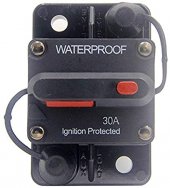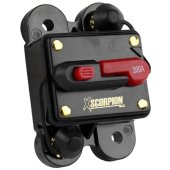meetyg
Solar Enthusiast
- Joined
- Jun 4, 2021
- Messages
- 1,093
Hi there.
Having seen some of Will's beginner videos and read across his site, I'm a bit confused and would appreciate your help.
For example in this video, he uses only one fuse on the battery for the load and the SCC:
I understand that you should have a fuse directly on the battery.
Is it wise to connect loads and the SCC to this one fuse?
If the load shorts for some reason, the battery will be protected.
But won't that cause damage to the SCC in some way ? If so, does it matter if its a PWM or MPPT?
Shouldn't we be putting a separate fuse to from the battery to the SCC ?
I suppose the SCC has some capacitors/FETs in it, won't these be damaged due to a short on the battery side (or at least cause a spark/arc)?
For my use case I'm talking about 12v/20Ah SCC and LifePo4 battery - does it make a difference if its a larger system (lets say 24v/48v and a few hundred amps)?
I thought about using one of those 30A reset-able circuit-breaker fuses on my battery, because it also allows me easy disconnect if I need to do some maintenance on my setup.

Would you recommend it, or should I get a proper disposable fuse?
Thanks
Having seen some of Will's beginner videos and read across his site, I'm a bit confused and would appreciate your help.
For example in this video, he uses only one fuse on the battery for the load and the SCC:
I understand that you should have a fuse directly on the battery.
Is it wise to connect loads and the SCC to this one fuse?
If the load shorts for some reason, the battery will be protected.
But won't that cause damage to the SCC in some way ? If so, does it matter if its a PWM or MPPT?
Shouldn't we be putting a separate fuse to from the battery to the SCC ?
I suppose the SCC has some capacitors/FETs in it, won't these be damaged due to a short on the battery side (or at least cause a spark/arc)?
For my use case I'm talking about 12v/20Ah SCC and LifePo4 battery - does it make a difference if its a larger system (lets say 24v/48v and a few hundred amps)?
I thought about using one of those 30A reset-able circuit-breaker fuses on my battery, because it also allows me easy disconnect if I need to do some maintenance on my setup.

Would you recommend it, or should I get a proper disposable fuse?
Thanks
Last edited:



